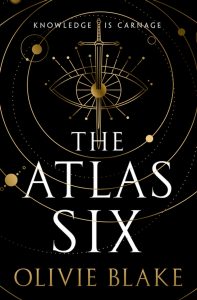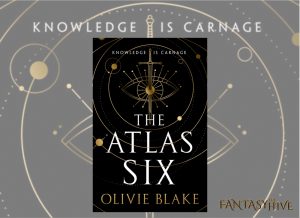THE ATLAS SIX by Olivie Black (BOOK REVIEW)
“We all have the exact curses we deserve”
The Atlas Six, Olivie Blake – Coming March 2022 from Tor
Lucy Nield PhD Candidate, University of Liverpool.
Twitter: @lucy_nield1 Instagram: @lucy_dogs_books
Olivie Blake is a lover and writer of stories, and is the pen name of Alexene Farol Follmuth. Many of her stories involve the fantastic, the paranormal, or the supernatural, but not always. More often, her works revolve around what it means to be human (or not), and the endlessly interesting complexities of life and love.
 Olivie Blake’s The Atlas Six, is the first book in what Amazon calls an ‘explosive’ trilogy. Blake’s novel challenges the concepts of team work, selfishness and greed, forcing the reader to consider what lengths they would go to, to obtain power, knowledge and the undeniably craved ‘meaning of life.’ A cocktail of magic, the mythological and depressing capitalism that plagues the modern world, Blake presents a us with an unpredictable narrative and characters we probably do not want to admit that we connect with. The characters are not the most likable that I have read, but whether you like them or not, there is a familiarity one finds in them. Similarities that are evoked by the unspoken, such as lust, hate and other emotions society teaches us to ignore and keep to ourselves. The first in The Atlas trilogy, The Atlas Six needs to be devoured, then we can impatiently wait for the next book together.
Olivie Blake’s The Atlas Six, is the first book in what Amazon calls an ‘explosive’ trilogy. Blake’s novel challenges the concepts of team work, selfishness and greed, forcing the reader to consider what lengths they would go to, to obtain power, knowledge and the undeniably craved ‘meaning of life.’ A cocktail of magic, the mythological and depressing capitalism that plagues the modern world, Blake presents a us with an unpredictable narrative and characters we probably do not want to admit that we connect with. The characters are not the most likable that I have read, but whether you like them or not, there is a familiarity one finds in them. Similarities that are evoked by the unspoken, such as lust, hate and other emotions society teaches us to ignore and keep to ourselves. The first in The Atlas trilogy, The Atlas Six needs to be devoured, then we can impatiently wait for the next book together.
We have all read stories or heard rumours about the Library of Alexandria, one of the largest and most significant libraries of the ancient world. That is until it’s decline that began with a fire in 48 BC, ending with a lack of funds around 250 AD. What if there was more to the story? What if the library didn’t burn, but was simply moved? What would you do to see inside the archives?
Blake’s novel leaks between genres of fantasy and historical fiction, parts are positively phantasmagorical, but mostly the setting teeters on the edge of realism. Her world has many similarities to our own; over population, social media platforms, capitalism that rages on with a determination like no other, but there is a huge difference to her world and ours. A portion of the population has magic, and they do not hide it like many other contemporary magical narratives. Her story follows six characters who all possess various types of magic; two Physicists, a Naturalist, a Telepath, an Empath and an Illusionist (of sorts). They are the best the world has to offer, and they have a difficult decision to make.
From the moment you open Blake’s novel, you cannot ignore her imaginative approach to magic. Early in the novel, we are introduced to a character named Tristan, who is technically an Illusionist, but his real power is that he can see through illusions. He can see the things that no one wants you to see, from your magically-enhanced breasts, to fake walls or false animated corpses, Tristan knows your secrets, and he can see through it all. Possibly the most interesting, and certainly my favourite, power of the book belongs to Reina. She possesses power of the highest medeian calibre, which the doctors noticed when she was born. As a baby in the hospital;
“There wasn’t a lot of natural life […] but what did exist – the decorative plants sitting idly in the corners, handfuls of cut flowers in vases meant for sympathy – had crept towards her infant form like nervous children, anxious and yearning and fearful of death”
Reina is a Naturalist, the plants call to her, reach out to her and she tries desperately to ignore them. What I found most compelling about Blake’s use of plants, and the concept of Life in general (Life finds a way…), is the delicate communication between the plants and Reina:
“Can we? Asked the seeds in their little seed language, which felt mostly like tiny pricks against her skin. Like Children’s Voices, pleasepleaseplease Mother may we?
She Sighed.
“Grow.””
The plants beg for recognition, for permission and to be soothed by ‘Mother.’ There are echoes of infantilization and familiarity with the plants, which sounds incredibly uncanny. An apt feeling when reading Blakes novel. Not only does Blake Blugeonly force you to acknowledge your own darkness, such as what you might kill for and why, she also plays with the Freudian complexities of the familiar and the unfamiliar, or the heimlich and the unheimlich. She stirs in concepts of the Uncanny, such as telepathy, anthropomorphism, magical thinking, repetition, automatism, animism, and uncertain identities. In doing so, Blake manages to lure the reader in, playing with uncomfortable yet familiar concepts to engender a reaction and a recognition from the reader that one simply cannot ignore. The more you read on the less certain you become, a feeling foreshadowed in the text itself:
“The problem with knowledge, is its inexhaustible craving. the more of it you have, the less you feel you know”
The novel takes us on a journey. As we follow our six magical characters, we learn about the darker parts of being human. The parts we do not want to acknowledge and do not want other people to see. With secrets exposed and (truly) unpredictable twists leading to the end of this, the first of The Atlas trilogy, we are left with an empty feeling of dissatisfaction. Not because the book has disappointed us, but because it has wet the palate, and you find yourself hungry. Hungry to know more, to know what happens next. We have been on the journey with the characters, found ourselves part of their quest. A quest for knowledge, for power and to decipher the meaning of life. Only to discover that:
“People think it’s the meaning of life that matters,” […] “it’s not the meaning,”[…] “Everyone wants a purpose, but there is no purpose. There is only alive and not alive.”
This review copy was sent to me by Black Crow PR
Socials – Twitter and Instagram: @BlackCrow_PR
Olivie Blake Twitter & Instagram: @OlivieBlake

